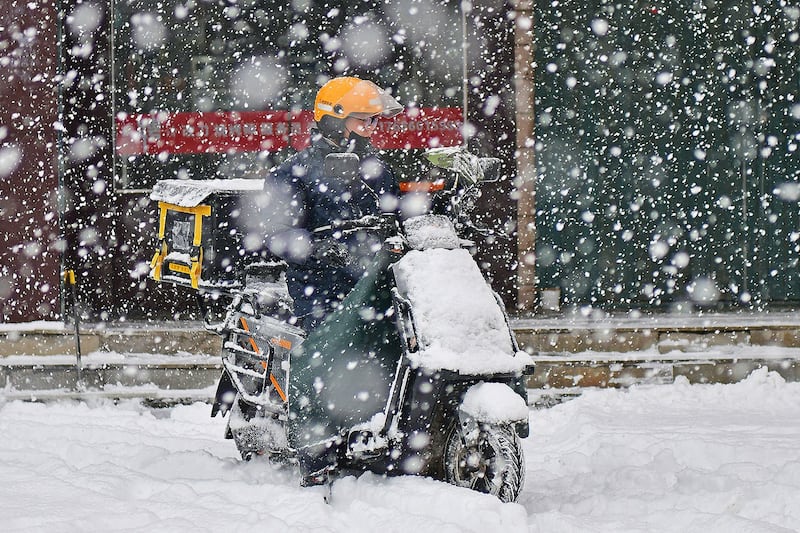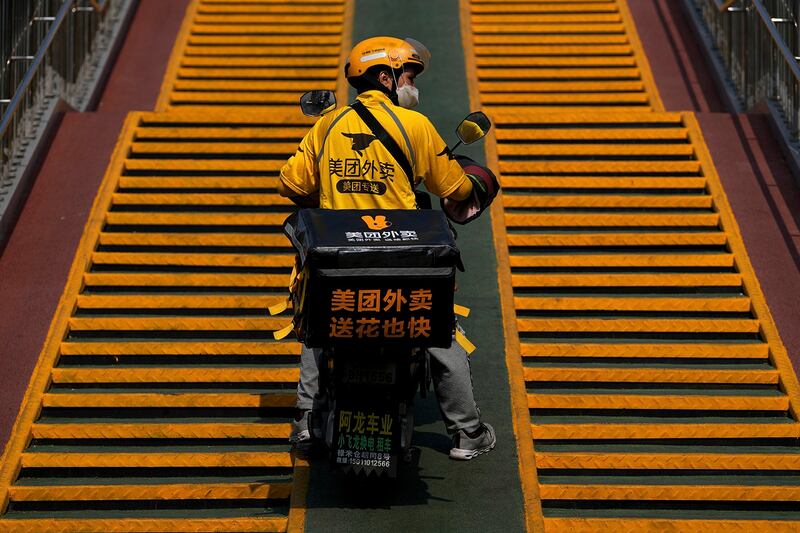Read coverage of this story in Mandarin and Cantonese
The sudden death of a 55-year-old delivery worker on the streets of Hangzhou this week has shone the spotlight on tough conditions for China's millions of takeout riders.
The man, identified in media reports only by his surname Yuan, was found dead lying on his electric scooter outside a residential complex in Hangzhou’s Yuhang district in the early hours of Sept. 6.
He had been slumped there a while before fellow riders realized he wasn’t just taking a nap between shifts.
“A man was found unconscious in the non-motorized vehicle lane near Yale International Garden in our jurisdiction and was declared dead after attempts to resuscitate him failed,” the Xianlin neighborhood office said in a statement to social media dated Sept. 9. “The deceased, surnamed Yuan, male, 55 years old, was a food delivery rider and police have ruled out pursuing a criminal inquiry.”
News of Yuan's death went viral on social media, prompting a wave of soul-searching about the privations of the gig economy in the current economic downturn that has seen more than one million restaurants close.
Government-backed news outlet The Paper reported that Yuan had slept just three or four hours a night, sometimes starting work at 6 a.m. and working until 3 a.m. in a bid to clock as many orders as possible.

Yuan's isn't the first sudden death to be reported in the industry, where riders can expect to make on average around 4.5 yuan (US$0.63) per delivery, according to a recent report by Sanlian Lifeweek Magazine.
While official statistics haven’t been made available, a keyword search for “sudden death of delivery riders” in Chinese pulls up a slew of media reports dating back to January 2021, involving riders of various ages. But working excessive hours appeared to be a common factor in all of the reports.
Timing algorithms
Former delivery rider Lu Qiankun said Yuan’s death wasn’t an isolated case.
"The sudden death of delivery riders is a common occurrence," Lu, who smuggled himself through the Central American rainforest to reach the United States after despairing of finding a decent job in China, told RFA Mandarin in a recent interview.
“I think it has happened in every city – I would think there have been at least 100,000 across the whole country,” he said, adding that he started working for the Meituan, Ele.me and Dada delivery apps in October 2020, while pandemic restrictions were still in force.
“It was three hours for breakfast, three hours for lunch and three hours for dinner,” Lu said. “Those were the regular hours, about 10 hours a day, but you have to work the rest of the time too, whenever you’re not sleeping.”
Falls from traffic accidents are also a major hazard for riders, particularly in icy weather, and Lu once had to take a month off work after breaking his arm, he said.

The Shanghai Municipal Public Security Bureau Traffic Police Corps reported in 2017 that one delivery rider was being killed or injured every 2-3 days in the city, at a time when the number of riders was nowhere near its current level.
Part of the problem is the way the apps work, according to Lu.
“Their timing algorithms are very powerful,” he said. “Usually, an order takes about 10 minutes, but if a rider only takes eight minutes, then the next time the platform will give them only eight minutes,” forcing riders to step on the gas to avoid being penalized for lateness.
Late deliveries mean bad reviews, deductions and further pressure to work faster to erase the impact of the bad review on a rider's ratings.
Run-ins with building security
When Lu was riding, he often had to rent a scooter and battery, the cost of which would be deducted from his earnings.
“The first 20 orders of the day basically only covered my costs, then the next 20-30 orders would be the money I would make that day,” he said, adding that police fines for traffic violations also take a bite out of rider incomes.
Lu thinks the entire system is highly exploitative, and traps riders into working all hours for no more than a basic subsistence income.
A 2023 survey by the China Social Sciences Academic Press found that around 50% of food delivery riders have a monthly income of 4,000-5,999 yuan (US$563-845), while only 7% make 8,000 yuan (US$1,130) or more a month.

The job is also stressful, with a high likelihood of conflict with the private security guards who patrol residential compounds in China.
“A lot of riders just lose it when they run into problems with residential security guards,” Lu said. “For example, if their bike is confiscated by traffic cops or impounded by urban management officials.”
“They feel like they have no way to live any more.”
‘No welfare protection’
A fellow delivery rider from Hangzhou who gave only the nickname Adam for fear of reprisals said the industry can suit younger and fitter individuals, as there are bonuses to be made during rainy weather, for example.
But he believes that more could still be done to offer some kind of safety net for riders.
“The biggest issue in this industry is that there’s no welfare protection,” he told RFA Mandarin in a recent interview. “The platform deducts three yuan a day every day as an insurance premium after our first order.”
“In other words, we renew our employment relationship with the platform each day, and it terminates in the middle of the night,” he said.
The next biggest problem is the low income. Adam, who delivers for Meituan, said he has seen his income fall since the ending of pandemic restrictions in 2022.
“Since the end of pandemic restrictions, Meituan has been gradually cutting its rates from more than 6 yuan (US$0.85) per order to 5 yuan (US$0.70) currently, or even less,” he said.
Part of the problem is the oversupply of willing workers.
“A lot of people have become unemployed in the past couple of years, and a lot of college students are working full-time as delivery riders,” Adam said. “Supply and demand determines the rate.”

Lu agreed, saying that even when delivery riders try to bargain collectively, the platform generally has the upper hand.
“We have tried, but in the end, they just wind up saying that if you don’t do it, someone else will,” he said. Adam, meanwhile, fears that stronger government regulation would wind up depriving people of opportunities to earn at a time of economic crisis for many.
Third-party agencies
Two days after Yuan’s death in Hangzhou, photos of delivery riders calling for collective bargaining and “China’s Martin Luther King” to stand up for gig economy workers started circulating on social media.
“We want our own union, our own spokesperson, and an eight-hour working day instead of 300 hours a month,” read a sign held up by a Meituan rider in one photo.
Part of the problem is that labor unions in China must all operate under the aegis of the ruling Chinese Communist Party. Independent unions seldom come into being, and are usually ruthlessly suppressed by the authorities, activists say.
Another issue is that riders are often recruited and hired by third-party agencies, so there is no direct relationship to the delivery platform at all. Such companies are supposed to arrange for riders to pay into social security funds and insurance policies, but many do not.
And there are considerable political risks to organizing and negotiating, according to Lu.
“If you say in a WeChat group that you plan to petition the government, the group will be immediately shut down, and the police will invite you to “drink tea,’” Lu said.
These days, Lu still works as a delivery driver for Uber Eats and Doordash in Louisiana, a situation he describes as more hopeful and manageable than life as a Chinese delivery rider.
“Everything’s going pretty well,” he said.
Translated by Luisetta Mudie.
